Alva Solomon
The Royal Gazatte
20th September 2025
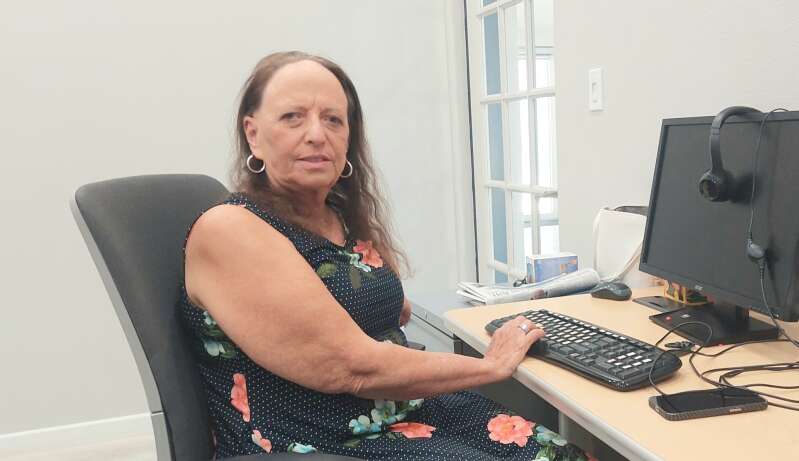
Phyllis Harshaw, a retired teacher who works at Vision Bermuda where she teaches typing skills to people with sight issues (Photograph by Alva Solomon)
A retired learning support teacher uses her experience to help people with sight issues embrace technology — including computers and artificial intelligence.
Phyllis Harshaw, a former teacher at CedarBridge Academy who is visually impaired, said she believes in the concept of “equifinality”, in which a common goal can be achieved through diverse strategies.
She explained: “Essentially, two different ways of doing things can end up with the same result.”
She has adapted to life with impaired vision by following the concept.
She added: “That’s why I like to teach here at Vision Bermuda. I can show the clients different ways to do things.”
Ms Harshaw teaches twice-weekly typing classes for six people with vision issues at the charity’s headquarters at Beacon House in Hamilton.
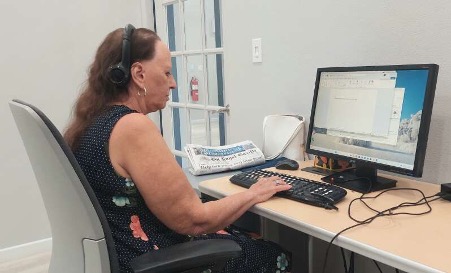
Phyllis Harshaw, a retired teacher who is visually impaired, teaches typing skills to people with sight issues (Photograph by Alva Solomon)
She has taught there since offering summer classes in 2016, prior to her retirement from CedarBridge in 2018 after 36 years as an educator.
Banking on her experience teaching public school pupils with learning disabilities, she brings a special approach to the charity’s classroom.
After learning how to navigate the keyboard, clients move on to typing sentences.
“We then build on the Word documents and other programs like the Excel spreadsheets,” she said.
Even with her years of experience using Microsoft Excel, Mr Harshaw said that from time to time she forgets tricks such as the shortcut keys to add a column.
She said: “I would have to go and Google it, and then the AI would tell me what to do.”
Ms Harshaw relies heavily on technology such as her iPhone for her daily duties.
She said the phone’s applications were user friendly — a plus for people with vision issues.
“iPhones have voiceover,” she explained. “There are two things working here: AI, which is Siri, and voiceover, which is the text to speech.
“Siri is my AI friend, and voiceover is even better a friend. I use Bluetooth most of the time.
“It is important for me to hear, and not everybody else to hear, if I get a text message or an e-mail.
“If I want to send an e-mail, I say ‘hey, Siri, send an e-mail’.”
Ms Harshaw joked that the digital assistant was “on strike today” when she spoke to her device to demonstrate for The Royal Gazette — and got no response.
Her clients at Vision Bermuda range from people with low vision issues to the fully blind.
To aid in their typing skills, she places plastic rubber stickers, called raised indicators, on the keyboard for clients to become familiar with the device.
She said the charity needed laptops for the clients to use in their free time at home, since many lack the means to purchase the devices.
Ms Harshaw’s vision began to decline when she was 8, from hereditary retinal degeneration, when a mix of genetic conditions cause retinal cells to deteriorate, leading to progressive vision loss.
At age 9, she fell while clambering up a poinciana tree, fracturing her wrist and elbow so severely that her arm had to be amputated.
She obtained her primary education at Cavendish Hall, the precursor to Saltus Cavendish, before moving on to the Whitney Institute, where her eyesight continued to fail.
One of her teachers at Whitney, Pat Hide, gave her a manual for touch-typing at the typewriter.
“That book helped me a lot,” she recalled.
“With computers, it is an amazing thing, because my computer talks to me and I type around 43 word per minute, thanks to that book.”
She went on to obtain a bachelor’s in education and a master’s degree in special education and learning disabilities from Adelphi University at Garden City, Long Island, New York, followed by a masters of arts, management and human resource development from Webster University in St Louis, Missouri.
She taught for several years at the Whitney Institute as a learning support teacher.
When CedarBridge Academy opened in 1997, she was among its first educators, spending 22 years there.
Ms Harshaw has an affinity for horses. Despite her vision issues, she rode horses all her life, including at the annual Agricultural Exhibition, and attended the tenth Paralympic Games in Atlanta in 1996 to compete in dressage.
The sprightly Ms Harshaw plans to continue teaching at Vision Bermuda since she does not consider herself as “actually retired”.
She explained: “I tell people I’m on a retired vacation, because I still have a lot to do and I am having a ball.”
Alva Solomon
The Royal Gazette
Created: Sep 15, 2025 08:21 AM (Updated: Sep 15, 2025 08:21 AM)

High hopes: Erica Ingemann, the executive director of Vision Bermuda, intends to increase awareness of the skill sets of people with vision impairment (Photograph by Alva Solomon)
The creation of a work readiness programme for people who are visually impaired is among key plans pursued by the head of a charity.
Erica Ingemann, who officially assumed the role of executive director of Vision Bermuda in May, also aims to use her creative skills to produce a national event that will recognise the charity’s cause and client community.
She said: “I want to expand the mandate, to expand the services that we offer.
“I would love nothing more than to find an entity, such as an organisation like the Bermuda College, to collaborate with to introduce a work readiness programme.
“Just because our client lost their vision, it doesn’t mean that they can’t work.
“That doesn’t mean that they do not have anything valuable to offer to an employer.”
To this end, she said, the charity intends to increase public education and awareness of the skill sets of people with vision loss.
Ms Ingemann, a speech pathologist, said: “I am very committed to taking this organisation to where it needs to go.”
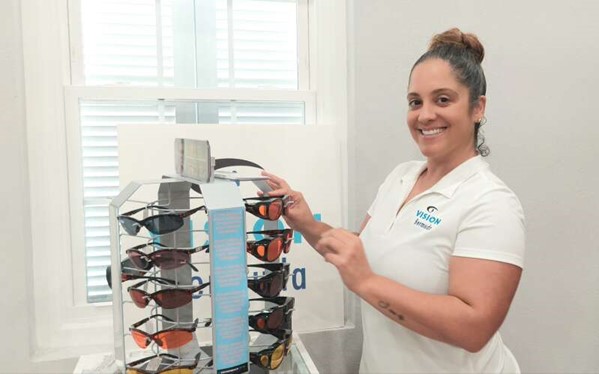
Erica Ingemann said Vision Bermuda is working to increase its visibility in the community (Photograph by Alva Solomon)
She said she recognised that Vision Bermuda needed more visibility in the community.
She said: “Increasing awareness is both a short and long-term goal because I don’t think enough people realise what Vision Bermuda is and how Vision Bermuda could be there for them.
“My ultimate goal is to ensure that everybody with vision loss knows that we are here for them.”
She said regardless of age or status, the charity caters for everyone.
“We want to be able to accommodate everybody with vision loss, we want to be diverse, to be kind of that hub.”
She said while awareness would benefit potential clients, it would also benefit the charity’s ability to attract support from the donor community.
“I wouldn’t say that we do not have long-term sustainability.
“Every year, we get out there and say, well this is what we need to do, let’s get out there and do it.
“But it would be so lovely to have some sort of a safety net, so that we know we have this amount of finance to work with every year.”
Ms Ingemann said she is working on a strategic plan that in time will enable the charity to fully optimise its core values and wider mandate.
The charity will host several activities for World Sight Day on October 9.
They include a raffle, an open house and, for the first time, a charitable event called Funky Frames Friday on October 10.
She said the goal of hosting the events “is twofold” since they create awareness and the charity will be able to raise funds.
In the long term, she said, an idea is being conceptualised by the charity to host an annual national event in recognition of the vision-impaired and the charity’s cause.
She said: “It may be a walk or another activity, but when people hear of it they will know its Vision Bermuda’s activity.
“It will benefit the cause we are fighting for, it’s something we are going to examine.”
Ms Ingemann said the charity is in need of volunteers, and anyone who has creative skills, as well as students in need of volunteer hours, can visit the charity’s office on Dundonald Street.
Vision Bermuda needs drivers who are willing to take clients to and from its offices, in particular a meeting it hosts monthly which runs late into the evening.
It is also working to improve its presence on social media and plans are in the making to create a newsletter to keep the public in tune with events and activities.
The charity has its genesis dating back to 1954 when the Beacon Club was created as a social group for people who were blind and vision-impaired.
It was officially established by the Bermuda Society for the Blind Act in 1957, operating a sheltered workshop out of the historic Beacon House.
After 50 years of operation, the need for a workshop diminished as sheltered employment was no longer sought.
A survey of the blind and vision-impaired population later led the society to develop the infrastructure to provide specialised professional vision rehabilitation services and promote public awareness, educational events and social activities.
In 2018, the society changed its name to Vision Bermuda to more accurately reflect its mission to serve anyone whose vision loss impacts their day-to-day activities, as well as their families, carers and also professionals with an interest in vision impairment.
Alva Solomon
The Royal Gazette
Created: Sep 08, 2025 08:45 AM (Updated: Sep 08, 2025 08:45 AM)
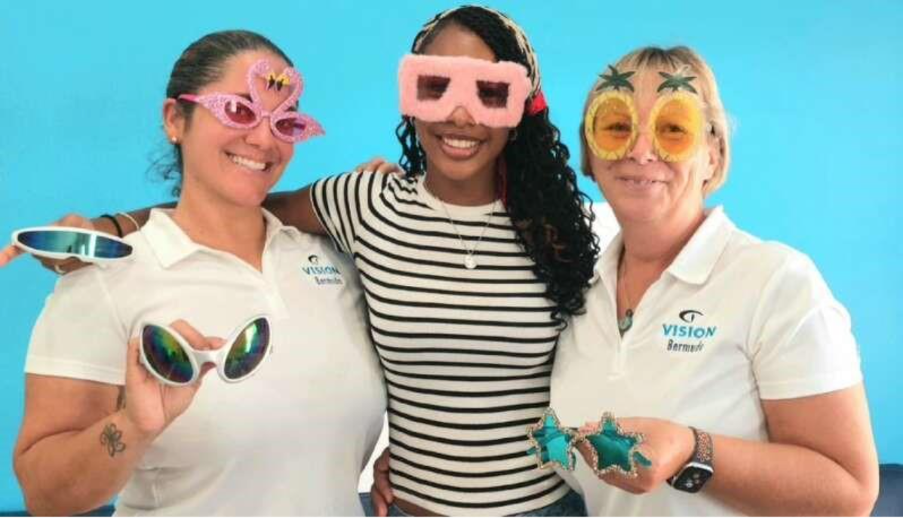
We see you: Erica Ingemann, executive director of Vision Bermuda, left, with volunteer Chaya Lambert-James and Theresa McMordie, vision rehabilitation specialist (Photograph by Alva Solomon)
A charity that supports people in Bermuda who are blind or visually impaired is hosting an event to amplify awareness of its cause.
Funky Frame Friday on October 10 will enable participants to showcase their “coolest, quirkiest and most stylish” glasses.
Erica Ingemann, the executive director of Vision Bermuda, said it was the first event of its kind hosted by the charity.
It is among several events delivered by Vision Bermuda as part of World Sight Day celebrations on October 9.
Ms Ingemann said: “Funky Frame Friday’s main mission is to promote awareness about vision loss, about prevention.
“The fun component of it is that we are asking people to wear their favourite frames, whether they be shades or glasses.
“We are also asking with this event for a small donation of $5 towards our cause.”
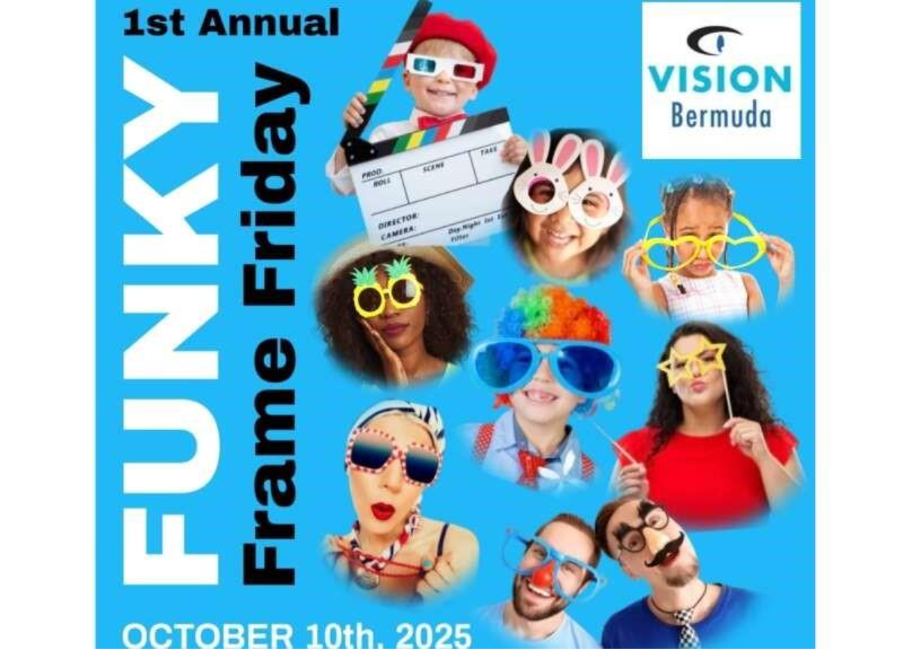
Private and public schools have been invited to participate in the event (Image supplied)
She said the island’s private and public schools have been invited to participate, emphasising that the charity’s aim is to create awareness of people with vision issues.
She said: “We are creating awareness from an early age and from awareness starts empathy.
“Everybody has been very positive about the event. We want everybody to get involved in the event as well.
“It’s something new for us and so we are looking forward to it.
“We are doing everything around World Sight day and that includes a raffle we are hosting around that day.”
She said Vision Bermuda will host the raffle drawing at its office on Dundonald Street in Hamilton at an open day on October 9.
The charity will also host a tag day at Lindo’s supermarket in Warwick on October 7.
Ms Ingemann, who took up the role of executive director of the charity in May, said Vision Bermuda was working to amplify its profile through a series of initiatives.

Alva Solomon
The Royal Gazette
Created: Sep 11, 2025 07:54 AM
Vision loss should not limit the ability to continue living independently, a rehabilitation specialist said this week.
Theresa McMordie, who has treated dozens of clients at Vision Bermuda over the past four years, said that people affected by visual impairment should try and continue as they normally would before they lost their sight.
She said: “You can do everything you used to do — besides driving of course.
“It’s my job to find a way around it, to make sure that one can still do things.
“As long as the client is willing to put in the work, we can find a way around it because you would still have your memory and your skills.”
Ms McMordie, who has been in the field for more than 20 years, said building a “good rapport” with her clients was integral to her job.
“This is because they won’t be open to the ideas, the way that things can be done,” she explained.
Ms McMordie said that she was recently reminded by a client that hope remained for people after they suffered a loss of vision.
She recalled a client who was very good at knitting and that with her encouragement and counselling, the woman continued to perfect her skills in the craft.
Ms McMordie said that the woman was able to complete knitted scarves for Christmas, which she was happy to give to friends.
The woman’s niece runs twice-monthly knitting classes at Vision Bermuda, where clients are producing knitted items for Christmas.
Ms McMordie recalled a young client who was losing her vision and was told by her doctor that she would lose her sight in a few years.
“She was told that she was going to be totally blind and she was crying,” the rehabilitation specialist said.
She added: “I had a talk with her and I explained that you can do assisted technology and so she was relieved that she was actually going to remain independent.
“She thought because she was losing her sight, that was it, she thought her whole life would be at a standstill.
“It’s an absolute fear and it’s because people aren’t aware that they can still be independent with sight loss.”
She is not sure of the total number of people on the island who are visually impaired but she treats about 300 clients at Vision Bermuda, ranging from teenagers to seniors. Most of her clients are retirees.
Ms McMordie urged residents to make sure that they care for their eyes and said that early detection of problems could be beneficial in the long term.
She explained: “If you’re not feeling well you may go to the doctor but if your eyes are feeling a bit blurry or you’re feeling a sudden difference in your vision, you don’t necessarily rush to get your eyes checked.
“I would argue it is really important because if you can catch eye conditions early, there are often ways that you can halt your sight loss.”
She said glaucoma and diabetic retinopathy were the main sight loss conditions experienced by people in Bermuda.
Ms McMordie added: “People love to have all of the lovely foods which is good, but diet really does matter, less sugar as well.
“Healthy eating and exercises, everything that we hear about that is good for being healthy is good for your eyes too.”
Ms McMordie also urged parents to ensure that their children’s eyes were screened regularly for early detection of vision issues.
She said: “They might not have had it diagnosed but there can be instances where a child may be sitting at the back [of a classroom] but they cannot see on the white board.”
Ms McMordie said that the Hamilton Lions Club ran an “absolutely great” annual vision screening project for preschoolers.
She added: “I think all parents, if they can, should take their children to have their eyes checked out to ensure they are seeing well.”
At Vision Bermuda, Ms McMordie runs a structured programme that includes the provision of emotional support, independent living support sessions, mobility and orientation sessions, support in the use of IT, and magnification assessments.
She relocated to Bermuda from Britain in 2021 to work at the charity and said that, so far, the experience had been “wonderful”.
“I love that I am still learning, too. I have a really nice rapport with my clients and my experiences and expertise here has gone through the roof,” she added.